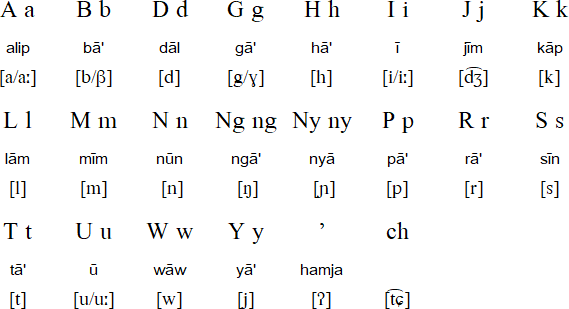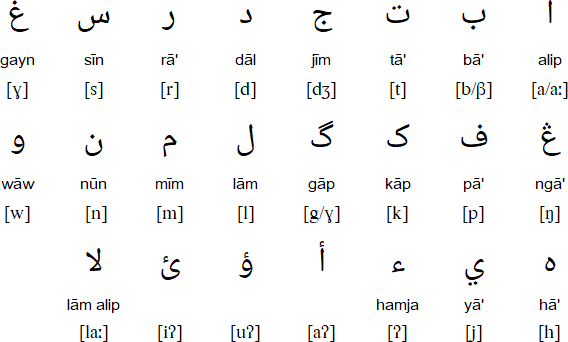Tausūg is spoken by about 1 million people in parts of the Philippines, in Malaysia, and in Indonesia, particularly on the Sulu Archipelago, the Zamboanga Peninsula, Southern Palawan in the Philippines, in Sabah in Malaysia, and in Kalimantan in Indonesia.
Tausūg a member of the Bisayan branch of Central Philippine languages, which is part of Malayo-Polynesian language family. Tausūg is closely related to the Butuanon language of northeastern Mindanao.
The name of the language in Tausūg is Bahasa Sūg, which means language of the Sūg where Sūg is taken to mean the area in which it is spoken (ie. Sulu). The word Tausūg is the name used colloquially where Tau means 'person' and hence Tausūg means 'person of Sūg' (Sulu).
These days Tausūg is written with the Latin alphabet. From the 7th century it is written with a version of the Arabic alphabet based on the Malaysian Jawi script. Tausūg was also written with a version of the Baybayin script known as Luntar Sug from the 7th century until the 16th century.

A macron over a letter (ū) indicates a long vowel.

Download alphabet charts for Tausūg (Excel)
Information about Tausūg compiled by Robert Cerantonio
Wayruun tuhan malaingkan ha Allāh, hi Muhammad in rasūl sin Allāh.
وَيْرُٷنْ تُهَنْ مَلَئِڠْكَن هَ الله هِ مُحَمَّدْ ئِڠ رَسُولْ سِڠ الله
There is no god but Allah, Muhammad is the Messenger of Allah.
Information about Tausūg | Numbers | Proverbs |
Information about Tausūg
http://en.wikipedia.org/wiki/Tausug_language
http://iloko.tripod.com/Tausug.htm
https://www.webonary.org/tausug/language/orthography/?lang=en
Tausūg lessons
http://www.languagelinks.org/lessons/tausug/tausug.html
Aklan, Bantoanon, Bantayanon, Baybayanon, Butuanon, Caluyanon, Capiznon, Cebuano, Cuyonon, Hiligaynon, Kinabalian, Kinaray-a, Masbateño, Onhan, Porohanon, Romblomanon, Sorsogon (Southern), Surigaonon, Tausūg, Waray-Waray,
Adamaua Fulfulde, Afrikaans, Arabic (Algerian), Arabic (Bedawi), Arabic (Chadian), Arabic (Egyptian), Arabic (Gulf), Arabic (Hassaniya), Arabic (Hejazi), Arabic (Lebanese), Arabic (Libyan), Arabic (Modern Standard), Arabic (Moroccan), Arabic (Najdi), Arabic (Sudanese), Arabic (Syrian), Arabic (Tunisian), Arwi, Äynu, Azeri, Balanta-Ganja, Balti, Baluchi, Beja, Belarusian, Bosnian, Brahui, Chagatai, Chechen, Chittagonian, Comorian, Crimean Tatar, Dargwa, Dari, Dhatki, Dogri, Domari, Gawar Bati, Gawri, Gilaki, Hausa, Hazaragi, Hindko, Indus Kohistani, Kabyle, Kalkoti, Karakalpak, Kashmiri, Kazakh, Khowar, Khorasani Turkic, Khwarezmian, Konkani, Kumzari, Kurdish, Kyrgyz, Lezgi, Lop, Luri, Maba, Maguindanao, Malay, Malay (Terengganu), Mandinka, Marwari, Mazandarani, Mogholi, Morisco, Mozarabic, Munji, Noakhailla, Nubi, Ormuri, Palula, Parkari Koli, Pashto, Persian/Farsi, Punjabi, Qashqai, Rajasthani, Rohingya, Salar, Saraiki, Sawi, Serer, Shabaki, Shina, Shughni, Sindhi, Somali, Soninke, Tatar, Tausūg, Tawallammat Tamajaq, Tayart Tamajeq, Ternate, Torwali, Turkish, Urdu, Uyghur, Uzbek, Wakhi, Wanetsi, Wolof, Xiao'erjing, Yidgha
Languages written with the Latin alphabet
Page last modified: 07.02.24
[top]
You can support this site by Buying Me A Coffee, and if you like what you see on this page, you can use the buttons below to share it with people you know.

If you like this site and find it useful, you can support it by making a donation via PayPal or Patreon, or by contributing in other ways. Omniglot is how I make my living.
Note: all links on this site to Amazon.com, Amazon.co.uk
and Amazon.fr
are affiliate links. This means I earn a commission if you click on any of them and buy something. So by clicking on these links you can help to support this site.
[top]